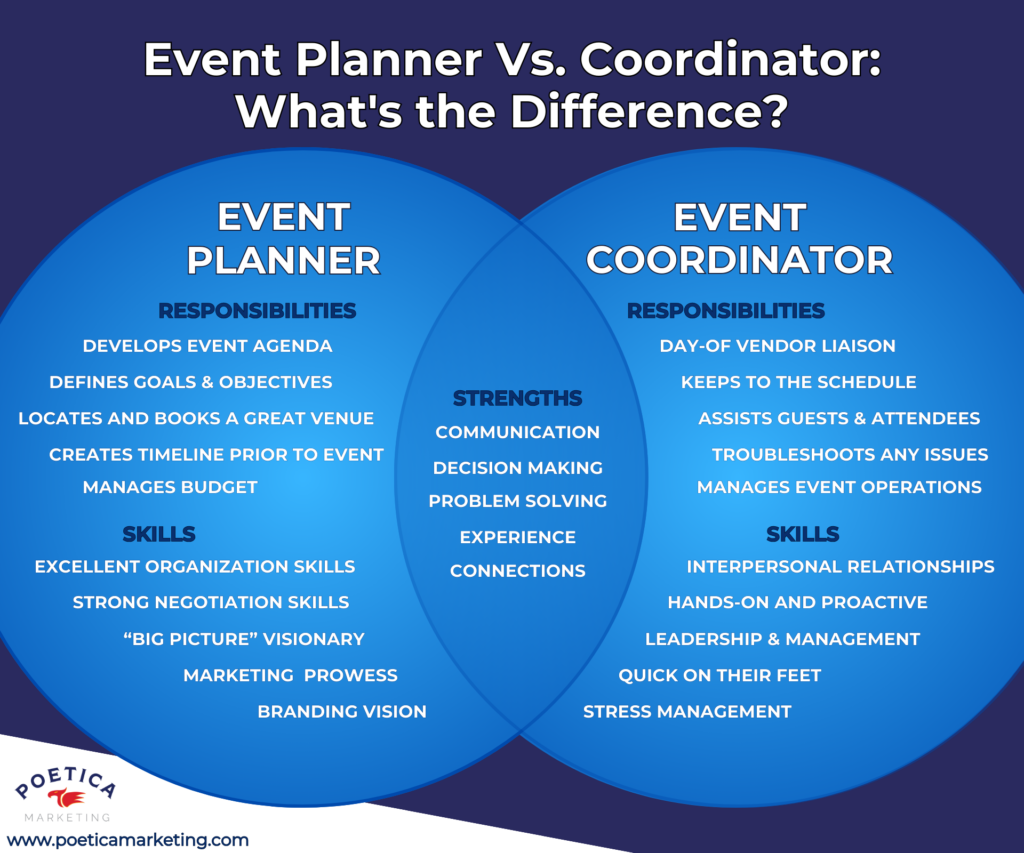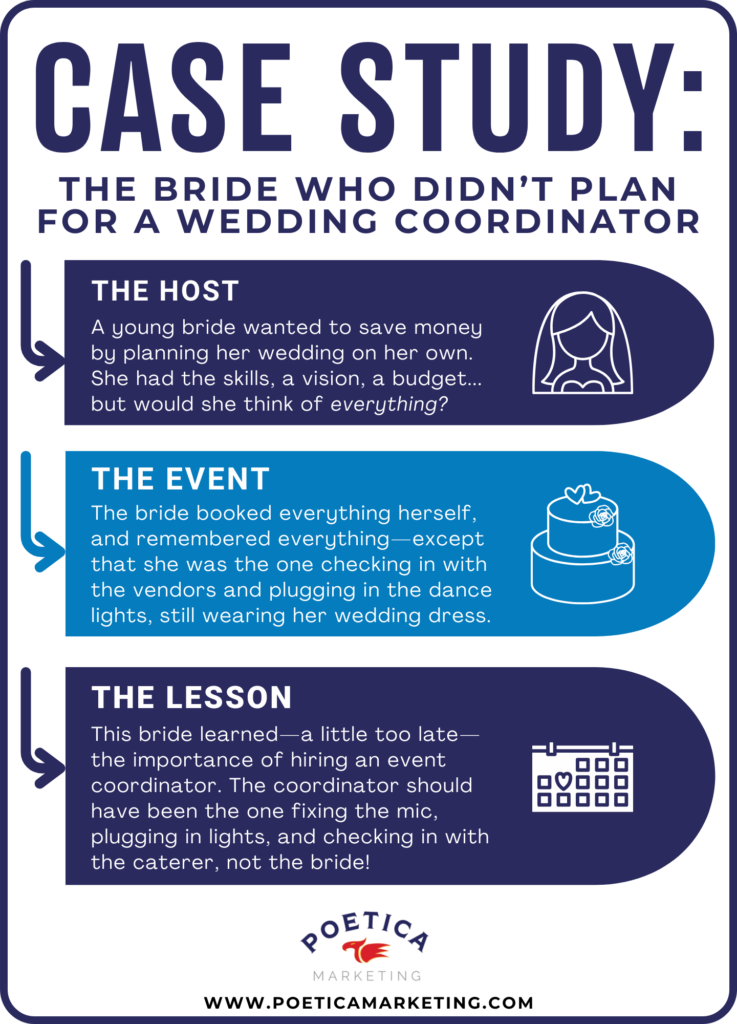Event Planner Vs. Coordinator: What’s the Difference?
Introduction to Two Event Roles
Planning an event is like putting on a show: Its success depends on both the cast and crew knowing their parts and working seamlessly to create a magical experience. In the event industry, two critical roles that contribute to this magic are the event planner and the event coordinator. While their functions may overlap, understanding the nuances between the two can spell the difference between a good event and a great one.

Understanding the Difference: Planner or Coordinator?
So, what’s different about an event planner versus an event coordinator? Think of the planner as the visionary architect who designs the blueprint, while the coordinator is the builder who turns plans into reality.
Learn even more about events by downloading the Events On A Budget eBook!
Event Planner: The Strategic Mastermind
An event planner’s role starts at the conception of an event. Their strategic vision sets the pace for the overall event design and flow. They’re the ones piecing together every intricate detail, from the theme and location to the speakers and content. Planners are strategists, carefully mapping out every aspect to align with the event’s goals.
Core Responsibilities of an Event Planner
Event planners are tasked with the following:
- Defining event objectives
- Budget management
- Venue selection
- Speaker and vendor coordination pre-event
- Scheduling and timeline development
The event planner gets the event from, “I have an idea…” to “Here’s how we can make it happen.”
Skills and Training Essential for Event Planning
A great event planner needs the following skillset:
- Excellent organizational skills
- The ability to see the “big picture”
- Strong communication and negotiation prowess
- A deep understanding of branding and marketing
- Typically, a background in event management, hospitality, or related field, often supported by certifications like the Certified Meeting Professional (CMP) designation or a degree in event management
Remember that an event planner does just that — plans! A great planner should be able to envision every detail and keep deadlines, due dates, and tasks under control so that the last-minute “panic” hosts often face—and expect—isn’t even an option.
Event Coordinator: The Execution Expert
An event coordinator springs into their element as the event draws closer. They are the action-driven professionals who make sure that the outcome aligns with the planner’s vision, Then, on the big day, they are the go-to person for ensuring everything goes according to plan.
What Does an Event Coordinator Do?
The coordinator deals with logistics, handling operations and troubleshooting on the ground. Duties often include:
- Overseeing the setup of the venue
- Direct communication with vendors and staff on event day
- Time management to keep each segment on schedule
- Solving any unforeseen issues
- Assisting guests and managing all event operations on the day
Event coordinators have to know every detail of the plan so they can keep the event running smoothly while still staying true to the event objectives and vision.
Necessary Skills for Effective Event Coordination
Make sure your event coordinator has the following skillset:
- Strong interpersonal skills to handle diverse teams
- An ability to stay calm under pressure
- Quick decision-making and problem-solving capabilities
- A hands-on approach to managing event day excitement
Experience and a background in hospitality or communications are valuable for an event coordinator, though many skills are honed on the job.
Collaborative Dynamics: How Planners and Coordinators Work Together
When your event planner and coordinator work in harmony, that’s when the true magic happens. Each brings their expertise to the table, and their combined efforts can create an event that’s both visionary and flawlessly executed.
When Planning Meets Coordination: A Synchronized Approach
The planner bolsters the event with meticulous design and detail, while the coordinator turns those plans into a living, breathing experience. Together, they ensure that the event’s vision and operations are synchronized. The real beauty of this partnership lies in how they manage to stay one step ahead, anticipating and adjusting to keep the event flowing smoothly.
Key Benefits of Aligning Planner and Coordinator Roles
When you combine a planner’s strategic thinking with a coordinator’s tactical approach, you get:
- Comprehensive oversight from conception to conclusion
- Increased efficiency and resource management
- Enhanced guest experience due to smoother operations
- Lowered risk of miscommunication and errors
- Strong foundation for handling unexpected challenges
Furthermore, having both roles in play boosts the probability of hosting a successful event by ensuring expertise across all event stages.
Are Both an Event Planner And an Event Coordinator Always Needed for Each Event?
The short answer is yes, you can’t—or shouldn’t—have one without the other!
The judicious pairing of a planner and coordinator has led to standout events, emphasizing how strategic planning, coupled with flawless coordination, creates unforgettable moments. However, depending on the size and scope of the event, one person can do both the planning and the coordinating!
Choosing to Hire One Over the Other
In some cases, companies and individuals believe that not hiring one or the other will save a few dollars, but that mistake can be costly.
Leaning on an employee or creating a committee to handle planning an event can create higher stress and less productivity for the employees in their everyday roles. Furthermore, once the event day comes around, those already overworked employees now have to wrangle attendees, stay on schedule, and put out the hyperbolic fires that pop up throughout the event. Yikes!
Hiring an event planner can alleviate much of that unwanted (and unnecessary) stress in the weeks and months leading up to the event.
Hiring an event coordinator for the day-of activities ensures that everything really will move along smoothly, and there is one point person to keep everything under control. Bonus: the host is able to fully immerse themselves into the event with their attendees.
The main issue with hiring a planner and not a coordinator, or vice versa, is that someone is always short-changed, and it’s usually the host of the event. Without a coordinator, the best plans will most likely fall flat, and, of course, without a professional third-party planner, the event may never reach its full potential.
Case Study: The Bride Who Didn’t Plan for a Wedding Coordinator
Sometimes it’s best to learn from others’ mistakes. Here’s an example of someone who tried to save money by planning and coordinating her wedding completely on her own, but ended up paying for it in headaches, in the end.

This bride was a true “DIY Bride.” She booked everything from the venue to the caterer to the photographer on her own. She had a strict budget, and she had enough experience that she was confident in her ability to plan and coordinate the wedding without hiring someone to do it for her.
And therein lies the problem: She did a great job planning ahead for her special day, although what she saved in a dollar amount, she paid for in time and hassle—but that’s a blog post for another day. Foolproof plan or not, on the day of the wedding, she was standing on the altar when the microphone stopped working. She was walking down the aisle when someone had to turn the volume up on the speakers. She was the one running around in her wedding dress plugging in the lights for the dance floor.
That “DIY Bride” was none other than me, Regina, Events Coordinator at Poetica Marketing. I completely learned my lesson, and today, I want to help other people realize how important it is to ask for help.
When all was said and done, hiring a wedding coordinator would have given me the freedom to fully relax and enjoy my wedding day. The coordinator is the one who would have fixed the tech issues and turned on the lights; the coordinator would have put my mind at ease and taken care of my guests; and the coordinator would have taken on most of the burden that my bridal party, both sets of parents, and I shouldered in order to keep costs down.
Looking back, it would have been worth the money to pay for a wedding coordinator, at the very least. I also have realized that paying someone to plan—or help plan—the wedding itself would have been worth the investment as well. I would have gotten a lot more sleep!
The Importance of Knowing the Difference Between Event Planner and Event Coordinator
Knowing the difference between the roles of an event planner and an event coordinator can help ensure that (1) the host of the event hires the correct person or team, and (2) the most accurate and complete support is provided to create an unforgettable event.
An event can’t survive without a plan and someone to execute that plan. Most hosts, the company or person holding the event, think that they can plan and coordinate on their own, but doing so leads to burnout, missed opportunities, overspending, and many more headaches.
An event planner has the experience, expertise, and gumption to make the very most of the event budget. They are familiar with which venues and vendors are best and worst to work with, and they know what to look for before making reservations and signing contracts that can’t be undone.
Once the event is ready to go, someone has to take the reigns. That someone—the event coordinator—has to know the goals and objectives laid out by the host and planner, and they have to be ready to do whatever it takes to keep the event on track. Any issue that pops up—and there’s always something that pops up—is handled with poise and expertise. Juggling guests, an agenda, and vendors is crucial to keeping the event moving.
It’s imperative that the planner and coordinator work well together and support the event as a cohesive team. When the two work as one; better yet, if one professional sees an event through from beginning to end, the result is seamless excellence, worthy of a standing ovation.
FAQs: Clarifying Event Role Confusion
What Are the Major Differences Between an Event Planner and an Event Coordinator?
An event planner designs and plans the event, establishing its objectives and details, while an event coordinator focuses on executing those plans and ensuring the event runs smoothly.
How Do I Decide If I Need an Event Planner or Coordinator?
Consider an event planner for overall design and strategy if your event is in the early stages. Choose an event coordinator for logistics and day-of execution if the plans are already set. The best-case scenario would be to hire both a planner and coordinator, or someone to cover both!
Can One Person Perform Both Planning and Coordinating Roles for an Event?
Yes! In fact, it’s great to have one person who leads the planning and coordination of an event, because they can act as the director who sees the vision and execution through from beginning to end, streamlining the process.
What Qualifications Are Needed to Excel in Either Role?
Event planners often benefit from a background in event management and strategic skills, while coordinators excel with strong logistical, problem-solving, and communication abilities.
Hire An Event Planner or Event Coordinator
To hire an event planner or coordinator, contact us! We have the experience necessary to turn your idea into an incredible, unforgettable reality!
